You are hereBlogs / WcP.Story.Teller's blog / Piracy renewed: almost 40 ships seized by Somali pirates & more than $150m(£101m) in ransoms paid so far this year
Piracy renewed: almost 40 ships seized by Somali pirates & more than $150m(£101m) in ransoms paid so far this year

Troubled waters & age-old problem renewed: pirates inspired by Johnny Depp’s antics or by oil - the new treasure?
(quote)
Three escape pirate-hijacked tanker
NAIROBI, Kenya (CNN) -- Three British guards jumped overboard and were rescued from the water after battling in vain to prevent pirates hijacking a chemical tanker off the coast of Somalia. The Liberian-flagged Biscaglia came under "sustained and heavy attack" early Friday morning, Nick Davis, Director of Anti-Piracy Maritime Security Solutions (APMSS), said in a statement. The three APMSS-employed security guards -- all former British servicemen -- mounted "sustained non-lethal resistance" but were unable to stop the attackers seizing control of the ship, Davis said.
The trio were airlifted to safety by a German naval helicopter and flown to a French frigate after the vessel summoned assistance from coalition warships. They were later transferred to a British Royal Navy ship. All three were unhurt, Davis said. "I have spoken with my team leader on the phone and he informs me that the level of violence was significant and forced them reluctantly to leave the vessel after every effort was made to ensure the safety of the ships crew," Davis said. Pirates continued to shoot at the three in the water, Davis said. "The hijacked vessel with pirates in control then attempted to run them down."
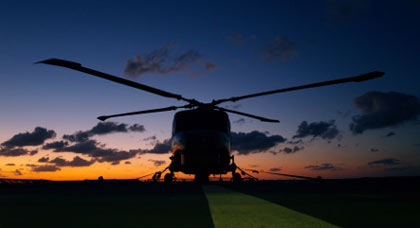
Navy chopper fishes pirate victims out of sea
A German navy helicopter has fished three men out of the ocean after Somali pirates hijacked a Liberia-flagged vessel in the Gulf of Aden on Friday morning, French navy sources have reported. The three crewmen belonged to The Biscaglia, believed to be a chemical and oil tanker that was in the gulf off the Horn of Africa. The ship was attacked early in the morning by five pirates, said Jean-Marc Le Quilliec, commander of the French frigate Nivose. The men escaped the attack by jumping overboard and were rescued, he said. The three crew members were fished out by a German navy helicopter and were to be dropped off on another French ship nearby, he told an AFP reporter on board the Nivose. The waters off Somalia are among the most pirate-infested in the world. Several German ships, yachts and hostages have been captured for ransom by pirates off the Horn of Africa in recent months.
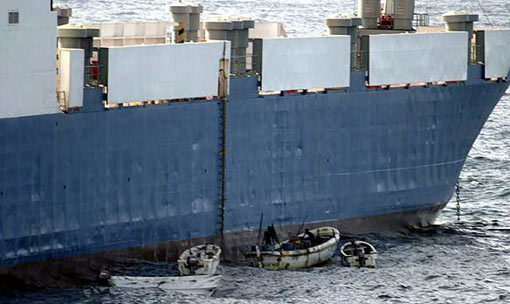
Troubled waters and bloody consequences
At more than 330 metres in length, the Sirius Star is a massive vessel, one rivaling the size of a U.S. aircraft carrier. Yet in November 2008, pirates seized the Saudi-owned supertanker. The largest pirate capture to date, the Sirius Star carried a full load — an estimated two million barrels of oil worth more than $100 million US. And it happened more than 800 km off the coast of Kenya, well beyond where Somali pirates usually operate. "The world has never seen anything like this. … The Somali pirates have hit the jackpot," Andrew Mwangura, who has been monitoring piracy for years as co-ordinator of the East African Seafarers' Association, told Reuters.
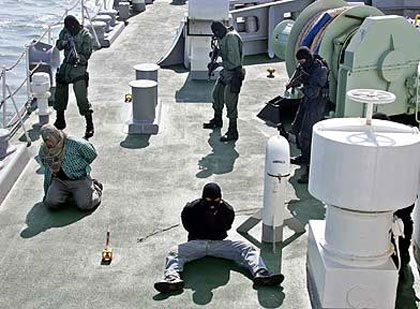
Age-old problem renewed
Piracy is nothing new of course; it dates back almost to the first time humans travelled by sea. But after being curtailed greatly in the 20th century, the problem has spread with a vengeance since the end of the Cold War, when many countries scaled back on their naval operations. In the early '90s, the United Nations reported roughly 100 incidents worldwide per year, mostly on the South China Sea and in Southeast Asia. By the end of the decade, however, that number jumped by almost 450 per cent. After some decline in the middle of this decade, piracy appears to be on the rise again. Last year, the number of incidents jumped to 263, a 10 per cent increase from 2006. And this year promises to be no better, with 199 incidents reported to the International Maritime Bureau in the first nine months.
However, many organizations say the actual rate of piracy is much higher because a large amount of criminal activity goes unreported. Some organizations estimate the real price tag of piracy is as high as $16 billion US. The pirate trade, of course, has a more human cost as well. Experts say the bandits have become bolder and more aggressive in tactics in recent years. Last year, for example, there was a 35 per cent increase in pirate incidents involving guns. And so far this year, 581 crew members have been taken hostage. Of those, nine were killed and seven were missing and presumed dead. As of the end of September, 12 ships were still being held.
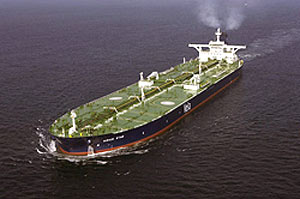
Somalian pirates seize giant oil tanker
NAIROBI, KENYA — In a dramatic and unprecedented display of prowess, suspected Somalian pirates operating far out in open waters have seized an oil tanker as long as an aircraft carrier, the U.S. military said Monday. The Sirius Star, flying the Liberian flag, was hijacked and its multinational crew of 25 were kidnapped by pirates off the coast of East Africa on Saturday more than 450 nautical miles from the port of Mombasa, Kenya. The ship appeared headed toward Somalia, the East African country from where many of the region's pirates set out on raids, according to the U.S. 5th Fleet.
The pirates made no immediate demands, said U.S. Navy Lt. Nathan Christensen. "It's the largest ship we've seen attacked," Christensen said from the fleet's base in Manama, Bahrain. Navy Adm. Michael Mullen, chairman of the Joint Chiefs of Staff, said he was not surprised that pirates could capture such a massive vessel, which are often lightly manned. But he did express shock that the pirates could operate so far out at sea. "I'm stunned by the range of it," Mullen said at a Pentagon news conference. "Four hundred fifty miles away from the coast, that is the furthest, the longest distance I've seen for any of these incidents."
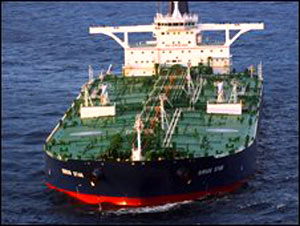
Ship owners call for UN-led force
One of the pirates holding the Saudi oil tanker Sirius Star has told the BBC that they have no intention of harming its 25 crew. The man, calling himself Daybad, also said they had so far not negotiated with the ship's owners, speaking only to intermediaries who "cannot be trusted". The tanker was seized earlier this month and is carrying $100m (£67m) worth of oil. Reports have said the pirates are trying to obtain a multi-million dollar ransom.
Almost 40 ships have been seized by Somali pirates so far this year. Kenya reported on Friday that Somali pirates had been paid more than $150m (£101m) in ransoms in the past 12 months.
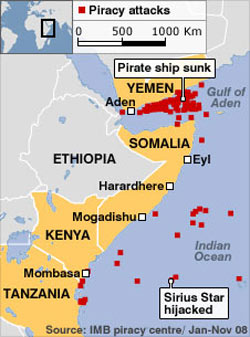
DH News Service, New Delhi:
What was thought to be a military success seems to have turned out to be a big diplomatic headache for India as the naval stealth frigate, INS Tabar, has sunk a Thai fishing trawler suspected to be a pirate vessel in the Gulf of Aden on November 18.
Thailand has sought a clarification from India on its rules of engagement in sinking an alleged pirate ship last week off the coast of Somalia after evidence has emerged that the ship was a Thai vessel, officials said in Bangkok on Wednesday. “We have asked the Indian authorities to help us verify the ownership of the vessel and then clarify their rules of engagement,” an agency report said quoting the Thai foreign ministry spokesman Tharit Charungvat.
Last week, the navy claimed success when it sank a suspected pirate vessel in the Gulf of Aden. But from Thai reports, it appears that the vessel, Ekawat Nava 5, is a fishing trawler registered in Kiribati, an island nation in the Pacific. Owned by a Thai national, Wicharn Sirichaiekawat, the vessel had lost contact with its mother ship on the same day and seized by the pirates.
(unquote)
Photos courtesy of U.S. Navy/Associated Press, Andy Wong/Associated Press, Daewoo Shipping Yards Associated Press/Newsis, BBC, AFP/Getty Images
Original Source: Deccan Herald, CBCNews, Chron.com, BBC News, CNN, and The Local


















